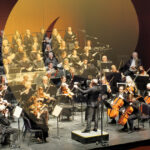Program Notes, ©2013 Lori Newman
Program Notes
Sergei Prokofiev Romeo and Juliet (1935-1936)
(Born 1891, Sontsovka, Yekaterinoslav district, Ukraine; died 1953, Moscow, Soviet Union)
William Shakespeare’s Romeo and Juliet has been the inspiration for numerous works in several genres, including art, music, opera, ballet, musical theatre, and film. The most successful ballet is by Sergei Prokofiev, although Prokofiev’s version was nearly destined for failure due to several missteps – some within Prokofiev’s control and some not. To understand the tortured route that his Romeo and Juliet underwent, it is important to understand the political climate of the time and the composer’s struggle for compositional independence in the Communist Soviet Union. While Romeo and Juliet was not expressly written under the oppressive political conditions that Prokofiev would later face, its premiere and subsequent performances, would be affected.
Prokofiev’s life was varied and interesting, his motivations and life choices somewhat puzzling. He began formal education at the age of eleven with the composer Reinhold Glière. While Prokofiev appreciated Glière’s tutelage, he would later write that he felt his teacher was too conservative in his lessons, and taught him “square” phrasing and traditional modulatory patterns. At the urging of the composer Alexander Glazunov, Prokofiev enrolled in the Saint Petersburg Conservatory at the age of twelve. His early style of composition was considered radical, atonal, and avant-garde, experimenting with polytonality, dissonance, high chromaticism, and irregular time signatures. He graduated with relatively average marks, mainly because he treated his time at the Conservatory as wasteful and boring. Despite this, Prokofiev had made a name for himself as a composer of the future before he was twenty years old.
His first big break came when the music publisher Boris P. Jurgenson signed a contract with the young composer in 1911. The contract allowed him to tour internationally, and in 1913 he traveled to Paris and London where he was introduced to Sergei Diaghilev and the famed Ballets Russes. He wrote several short ballets for Diaghilev, with varying degrees of success, but the experience of working with the balletic master would have a profound impact years later when he would begin Romeo and Juliet.
In 1918 Prokofiev left Russia, partially due to his fear of the Russian Revolution and Russian Civil War and their implications, and partially because he felt his music was too experimental to have lasting success in an increasingly stifling political climate. It is important to note that Prokofiev left with the blessing of the People’s Commissar of Enlightenment, Anatoly Lunacharsky. Lunacharsky told him, “You are a revolutionary in music, we are revolutionaries in life. We ought to work together. But if you want to go to America I shall not stand in your way.” Prokofiev arrived in New York in early September of 1918.
Life in America was not all Prokofiev had hoped for. He found brief, initial success, possibly due to people’s curiosity more than anything else, but he seemed to constantly be compared to, and in the shadow of, other Russian exiles, most notably Sergei Rachmaninoff. His one big success in the States was the commission of his opera The Love for Three Oranges. The premiere was delayed and the opera took so much time to compose that Prokofiev found it difficult to take on other endeavors and to financially support himself. Prokofiev decided living in America full-time was not for him. He then spent a period of going between Europe and America, until 1922 when he moved back to Europe.
Prokofiev was reunited with Diaghilev in Paris and spent the years 1922 – 1936 composing and living throughout Europe. All the while he was composing and succeeding in Western Europe, he continued to maintain ties to the Soviet Union. He toured there and began weighing his options for a possible return. He had decided to pursue a simpler musical scheme which was less harsh and experimental, and wondered if the style he envisioned for himself could fit in with the Soviet Union’s political ideals. It seems that he was well aware of the fact that his success or demise could rest solely on the established policies of the time, but he was interested in seeing if his music and the Soviet Union’s politics could find a symbiosis and balance. Prokofiev returned to the Soviet Union in 1936. Much has been written about his true reasons for returning to an increasingly oppressive country, moving ever rapidly toward Stalinism. Publically he stated a sense of nostalgia and homesickness, but this seems unlikely for the practical Prokofiev. It is possible with the Soviet Union’s censorship, he could not accurately gauge the political climate of the time, or it is possible that he saw an opening: Dmitri Shostakovich and his music had come under harsh attack in recent months, and perhaps Prokofiev saw himself conveniently fitting into the shoes of the Soviet Union’s most successful composer. Whatever the reason, Prokofiev returned and remained in the Soviet Union for the rest of his life.
In 1934 while Prokofiev was still splitting his time between Moscow and Paris, he received a commission for a full-length ballet from the Kirov Theater in Leningrad (now St. Petersburg). The composer decided he would choose a lyrical subject matter, Shakespeare’s Romeo and Juliet. For reasons unknown the Kirov backed out of its contract; it is suggested this was due to political pressure to purge composers considered “avant-garde” from their repertoire. In 1935 the Bolshoi ballet picked up the contract, but later backed out, claiming the music was impossible to dance to. It is also believed that the Bolshoi vehemently disagreed with Prokofiev’s ending of the work – he originally had written a happy ending to one of the most tragic and famous works in history. He explains in his autobiography:
There was quite a fuss at the time about our attempts to give Romeo and Juliet a happy ending – in the last act Romeo arrives a minute earlier, finds Juliet alive and everything ends well. The reasons for this bit of barbarism were purely choreographic: living people can dance, the dying cannot..But what really caused me to change my mind about the whole thing was a remark someone made to me about the ballet: ‘Strictly speaking, your music does not express any real joy at the end.’ That was quite true. After several conferences with the choreographers, it was found that the tragic ending could be expressed in the dance and in due time the music for that ending was written.
He changed the ending for the premiere in 1938, which finally, and quietly, premiered in Brno, Czechoslovakia. With the future of his Romeo and Juliet uncertain, Prokofiev created two orchestral suites and ten piano works from the score. (A third orchestral suite was later extracted.)
Prokofiev’s Romeo and Juliet saw its Russian premiere at the Kirov Theater on January 11, 1940. The production was fraught with difficulty. Prokofiev and the choreographer, Leonid Lavrosky, were at constant odds with each other, and the dancers complained that they didn’t understand how to dance to Prokofiev’s music. Lavrosky, without Prokofiev’s permission or knowledge, added music to the ballet and re-orchestrated some sections so that the dancers could more easily hear their cues. Despite these issues, the performance was both a commercial and critical success. The Bolshoi programmed the work in 1946, and it has remained one of the most popular ballets in the repertoire, and one of Prokofiev’s most enduring successes.
Around the time of the Bolshoi premiere, things got much worse for Prokofiev. The Zhdanov Doctrine was introduced which outlined strict policies for Soviet artists. Their works needed to avoid any type of “European formalism” and needed to conform to Soviet standards, mainly by way of including folk elements in their works and projecting happy outlooks. The works of Shostakovich, Prokofiev, and Aram Khatchaturian were particularly criticized and scrutinized, which eventually led to bans of certain works, often without the composers’ knowledge.
Prokofiev forced himself to write a letter in support of the doctrine and admit fault for the role he played in its necessity. He wrote that he appreciated the resolution and that “the conditions for the recovery of the entire organism of Soviet music” would be helped through the doctrine’s implementation. He went on to say, “that the formalistic movement which leads to the impoverishment and decline of music is foreign to the Soviet people and because it has shown us, with the utmost clarity, the aims toward which we must strive in order to serve the Soviet people as best we can.” He apologized for his use of formalism and atonality, but hoped that works such as Aleksander Nevsky, Hail to Stalin, Symphony No. 5, and Romeo and Juliet had shown he could compose works that fell in line with the party’s ideals. In the final blow, Prokofiev thanked the party “for the clear guidelines laid down by the resolution.”
The doctrine, censorship, and scrutiny seemed to break Prokofiev’s spirit, and many say he never recovered. He died on March 5, 1953, a mere hour before the death of Joseph Stalin. Prokofiev’s death was mentioned only briefly, overshadowed by the vast coverage of Stalin. It took three days to remove his body for burial because the streets were lined with Stalin’s mourners. A sad and tragic end to the life of one of the 20th century’s most gifted and visionary composers. It is difficult to not speculate what Prokofiev may have accomplished had he remained in Western Europe during the height of his homeland’s most artistically prohibitive period.




